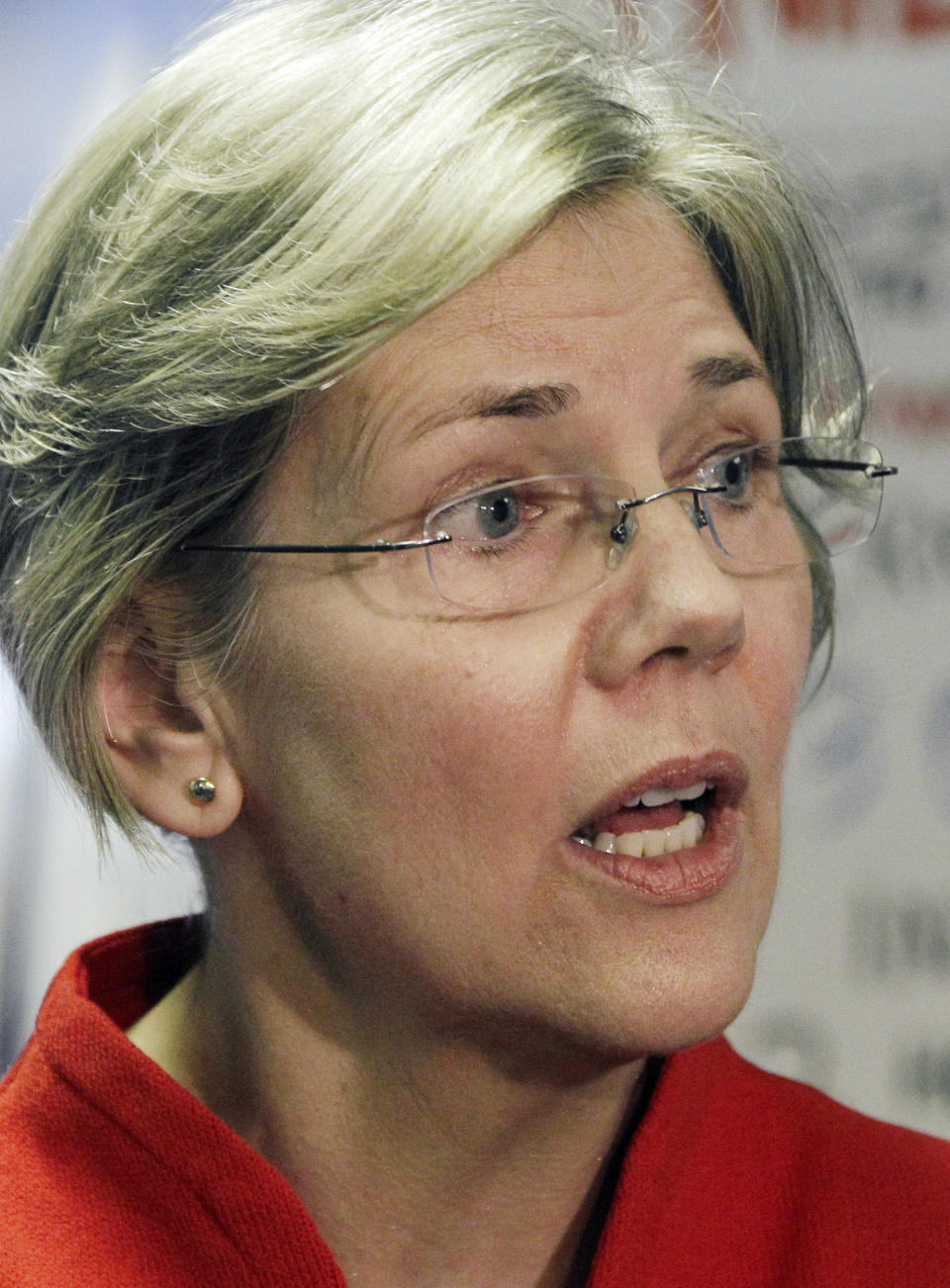Mass. Senate hopefuls tapping diverse donor bases
BOSTON (AP) — Republican U.S. Sen. Scott Brown is relying heavily on donations from the financial services and health care sectors while his chief Democratic rival, Elizabeth Warren, is tapping the wallets of lawyers, fellow academics, union members and filmmakers.
The race for cash comes as the two bulk up their campaign accounts for what could be the most expensive Senate election in Massachusetts history.
Brown pulled in more than $880,000 last year in donations from bankers, investors, venture capitalists, private equity professionals and others working in the financial services sector, according to an Associated Press analysis of itemized campaign contributions filed with the Federal Election Commission.
The donors worked for firms including Goldman Sachs, Fidelity Investments, J.P. Morgan, Barclays Capital, Bain Capital, BNY Mellon, State Street Bank and Credit Suisse.
That's in addition to the $60,000 Brown accepted from political action committees representing the financial services industry.
Warren received far less — about $175,000 — from individual donors in the financial services sector.
Warren took in far more than Brown from lawyers, collecting nearly $700,000 from attorneys compared to Brown's $348,000.
In an even starker contrast, Warren — a consumer advocate and Harvard Law School professor — received more than $309,000 from backers who identified their profession as professor. She's also a hit with her fellow Ivy Leaguers, collecting more than $100,000 from donors associated with Harvard University.
Brown received just $22,000, from professors.
Warren has also pulled in checks from the entertainment industry, including Hollywood heavyweights like Barbra Streisand, Danny DeVito and Dreamworks CEO Jeffrey Katzenberg, each of whom donated $2,500.
Self-described writers, filmmakers, film editors and artists contributed more than $203,000 in itemized donations to Warren compared to Brown, who pulled in less than $15,000 from the same group.
Candidates are required to list itemized contributions from individuals who donate more than $200 to their campaigns.
Both candidates also received support from the health care and pharmaceutical industry.
Brown received about $185,000 in itemized donations from doctors, nurses, dentists, medical device manufacturers, health care executives and those working for health care providers including Fallon, Harvard Vanguard, Partners Health Care, Steward Health Care, Covidien, Massachusetts General Hospital and Sanofi Aventis.
Brown also received another $123,850 from political action committees representing the health care and pharmaceutical sector.
Warren received more than $165,000 from the health care industry, but she collected more from individual doctors and nurses who donated more than $136,000 to her compared to $69,648 to Brown.
Brown has also received the backing of local fishermen, boat captains and workers in the seafood industry who contributed nearly $29,000 to his re-election campaign. Warren received virtually no contributions from local fishermen.
Brown's campaign has played up his in-state donations during the current election cycle.
"Unlike Professor Warren who is heavily reliant on out-of-state money from Hollywood elites and far-left liberals, Scott Brown is proud of the broad base of support he has received from within Massachusetts," said spokesman Colin Reed.
Warren's campaign was quick to point out that Brown received a torrent of out-of-state money during the last few weeks of the 2010 special election to fill the seat left vacant by the death of the late Democratic Sen. Edward Kennedy.
They said Warren has relied on smaller individual donations than Brown. Democrats have tried to paint Brown as "one of Wall Street's favorite senators."
"Elizabeth's fight for middle-class families continues to gain strong grassroots support here at home, with more than 23,000 people in Massachusetts contributing an average donation of $64." said campaign press secretary Alethea Harney. "People here and across the country want Elizabeth in the United States Senate taking on the big banks and special interests."
There's also a significant difference in how much each candidate raised outside Massachusetts. Warren collected 63 percent of her itemized donations from outside the state compared to about 40 percent for Brown.
Warren relied heavily on help from donors in California, New York and Washington, D.C. More than 17 percent of her itemized donations came from California, compared to 12 percent from New York and 9 percent from the nation's capital.
Outside Massachusetts, Brown relied more heavily from donors in New York, who contributed nearly 8 percent of his itemized receipts, followed by California, Illinois and Connecticut, each of which contributed less than 4 percent.
The reports also show Brown collected far more than Warren from political action committees in 2011.
Brown pulled in $1.6 million from PACs, more than ten times the $142,000 collected by Warren, who entered the race in September.
Among the PACs donating to Brown were groups representing defense contractors like Lockheed Martin Corp., Boeing Co., and General Dynamics Corp. He also received more than $30,000 in individual donations from workers and administrators at Raytheon.
Brown serves on the Senate Armed Services, Homeland Security, and Veterans Affairs committees.
Many of the PACs supporting Warren represent labor unions, including the Sheet Metal Workers International Association, the Laborer's International Union and the American Federation of Government Employees.
Brown, the only Republican in Massachusetts' congressional delegation, is facing a tough re-election campaign.
Although one recent poll showed him with a 9 percentage point lead over Warren, other polls have had the two locked in a tight race. Brown has cast himself as the underdog in a state where voters generally favor Democrats.



